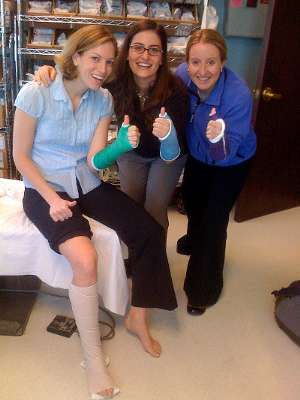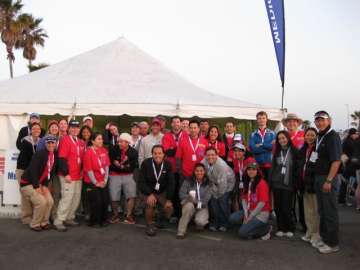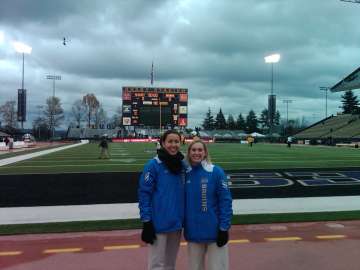Curriculum
Clinical Component

The UCLA sports medicine fellowship provides a comprehensive clinical experience that allows each fellow to develop expertise in the care of a wide range of medical and musculoskeletal problems. This extensive program involves exposure to issues seen in children and adults, and includes the care of elite and recreational athletes. This, coupled with a commitment to the enhancement of primary care skills, creates a challenging and dynamic learning environment.
The sports medicine clinical curriculum incorporates both longitudinal experiences and focused specialty rotations. Fellows provide patient consultations during weekly sport medicine clinics. Patients are seen by the fellow, and case by case, hands on teaching is provided by the faculty. Fellows also attend the Sports Medicine Clinic at the Arthur Ashe Student Health and Wellness Center, serving as consultants to the UCLA student population.
Each fellow also participates in a primary care continuity clinic. A full range of primary care is offered, including procedures such as splinting and casting, and office surgery.
Below is a list of the core clinics in which our fellows rotate:
- UCLA Comprehensive Sports Medicine Clinic: Westwood, Santa Monica, & Manhattan Beach
- UCLA Arthur Ashe Student Health and Wellness Center: Sports Medicine Clinic
- UCLA Family Health Center
Team Coverage
Another ongoing clinical responsibility involves the care of student-athletes through the Department of Intercollegiate Athletics. Each fellow receives UCLA team assignments, serving as the team physician providing care for both medical and musculoskeletal problems as well as event coverage. Fellows also staff the UCLA training room on a daily basis, treating medical and orthopedic problems. To promote further exposure to clinical and administrative issues, the program has well-established relationships with local high schools for which the fellow serves as the team physician. This involves weekly training room sessions and event coverage.
Specialty Rotations & Events

Specialty rotations allow the fellow to work side by side with recognized experts in several other clinical areas. The rotations include musculoskeletal radiology, hand clinic, foot and ankle clinic, the UCLA spine center, osteoporosis and bone health, and physical medicine and rehabilitation. Pediatric sports medicine is an integral part of the program and highlighted by a pediatric sports medicine clinic staffed by the faculty, as well as a pediatric fracture care clinic. To gain further experience in acute injury management, fellows rotate at an injury clinic at the base of a winter mountain resort. Fellows also have the opportunity to gain additional experience in surgical and musculoskeletal sports medicine during rotations with the UCLA Department of Orthopaedic Surgery, as well as with the Santa Monica Orthopaedic and Sports Medicine Group, a well established private practice.
Below is a list of the many specialty clinics in which our fellows rotate:
- Luskin Orthopedic Institute for Children: Pediatric Sports Medicine and Fracture Care
- UCLA Osteoporosis Center including DXA interpretation.
- UCLA Sports Surgery
- UCLA Department of Musculoskeletal Radiology
- UCLA Spine Center
- UCLA Hand Surgery
- UCLA Foot & Ankle Surgery
- Ski Injury Clinic at a winter mountain resort
- Santa Monica Orthopaedic and Sports Medicine Group
- St. Jude Medical Center, Sports Medicine
Fellows also participate in the planning and coverage of mass participation events. These special events have included NCAA and PAC 12 championship competitions, the Surf City USA Marathon (Huntington Beach), the LA Marathon, the Ironman California Triathlon (Oceanside), the Jackie Joyner Kersee/Rafer Johnson Invitational Track Meet, and the Special Olympics.
Educational Component
To further academic interest and provide a solid basis for research, fellows are enrolled in a series of seminars offered by the UCLA Clinical Research Center. The material covered in this program includes research methodology and study design, biostatistics, ethics in research, and grant writing skills development. Fellows also attend the Research Workshop for Sports Medicine Fellows sponsored by the American Medical Society for Sports Medicine. An in-depth review of musculoskeletal anatomy relevant to sports medicine is conducted in conjunction with faculty from the school of medicine. In addition, a comprehensive sports medicine knowledge base is covered in weekly seminars with the faculty. Longitudinal education is also provided by the UCLA Sports Medicine Conference Series, organized and run jointly by the UCLA Departments of Family Medicine and Orthopaedic Surgery.
Education conferences attended by our fellows include:
- UCLA Clinical & Translational Research Workshop
- Research Workshop for Sports Medicine Fellows sponsored by American Medical Society for Sports Medicine
- UCLA Musculoskeletal Ultrasound Course & Hands-On Workshop
- American Medical Society for Sports Medicine Annual Meeting
- American College of Sports Medicine Annual Meeting
In addition to being students of sports medicine, the fellows are also teachers. Educating family medicine residents, medical students, and students in the College of Health Related Professions is an important part of the fellowship, and serves to refine teaching and presentation skills.
Our fellows serve as teachers in the following academic settings:
- UCLA Family Medicine Residency Program
- UCLA School of Nursing
- David Geffen School of Medicine at UCLA
Research Component

In keeping with the goals of the program, each fellow is responsible for conducting a research project during the fellowship. The concept for the project is developed by the fellow and refined through discussions with faculty. Faculty guidance is an ongoing part of the research process. The many resources of the UCLA campus enable fellows to design and implement a wide variety of research projects. By planning, writing, and conducting a research project, a better understanding of the process of primary clinical research is achieved. Continued interest and participation in sports medicine research beyond the fellowship program constitutes the ultimate goal of this introduction to research.